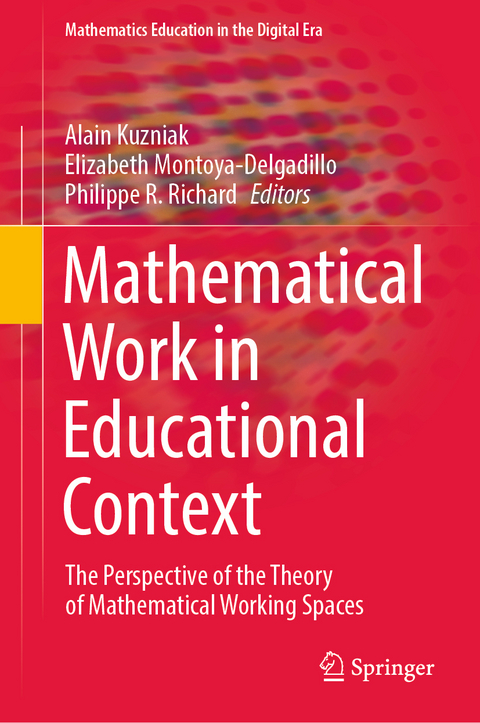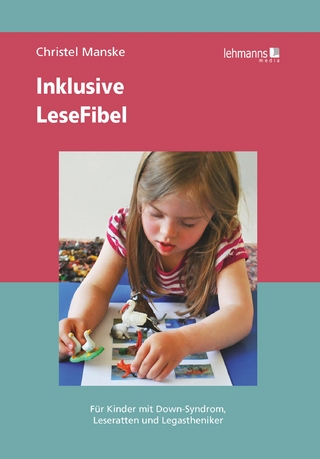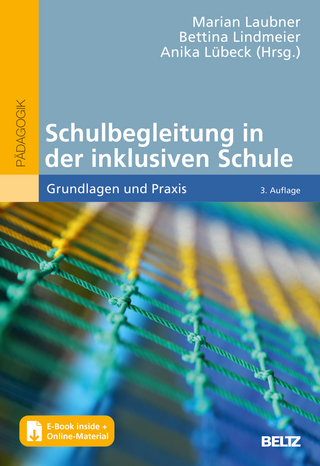
Mathematical Work in Educational Context
Springer International Publishing (Verlag)
978-3-030-90849-2 (ISBN)
This book is a friendly and complete introduction to one of the most comprehensive contemporary theories of mathematics teaching and learning. By focusing on mathematical work performed by students and teachers during mathematics session, the theory of Mathematical Workings Spaces (MWS) has opened up new perspectives and avenues on mathematics education and mathematical thinking. In particular, it enables the identification of students' knowledge production processes and helps teachers to shape them.
The first part of the book explores the heart of the theory and aims to further describe and understand epistemological and cognitive aspects of mathematical work. The second part develops the different MWS dedicated to observing how this work depends on the expectations of educational systems, how it is formed and taught, and how individuals appropriate it. In the last part, some applications and perspectives are discussed regarding topics of major importance today in mathematics education which relate to technological and digital tools, teacher training and modeling activities.
In line with the spirit of the theory, the book was written to reflect the conceptual unity at the heart of the theory of MWS and, at the same time, to show the freedom and diversity of approaches given space therein. Written for researchers and professionals in mathematics education, it offers plenty of concrete examples from different educational systems around the world to illustrate the theoretical concepts and show the applicability of the theory to practice and research.
lt;p>Alain Kuzniak is professor emeritus at the Université de Paris and member of the Laboratoire de Didactique André Revuz (LDAR). Among his various academic responsibilities, he was Director of the Doctoral School "Scientific Knowledge" and of the Master of research in didactics of disciplines, Director of the LDAR, President of the French Commission on Mathematics Education, member of the Scientific Committee of the International Congress on Mathematical Education (ICME13) and President of Espace Mathématique Francophone in Dakar. He is involved in the creation and development of the Theory of Mathematical Working Spaces. His research interests include geometry didactics, probability didactics and didactics of analysis and teacher training at university level. He has supervised several doctoral theses and has been a doctoral jury member in various countries, including France, Germany, Cyprus, South Africa, Chile, Mexico and Canada.
Elizabeth Montoya is professor at the Institute of Mathematics of the Pontifical Catholic University of Valparaíso (PUCV). She is also a member of the Board of Directors of the Faculty of Science. She has also been Vice-President of the Mathematical Society of Chile and is the Chilean representative at ICME. As a specialist in mathematics didactics, her research focuses on analysis and reasoning in relation to modelling and teacher training. She has been involved in the development of MWS theory since its creation and was president of the organizing committee of the Sixth Symposium on Mathematical Work in Valparaiso in December 2018. As Director of the PUCV doctoral program in mathematics education, she also has extensive experience in teaching and supervising research on mathematics education.
Philippe R. Richard is professeur titulaire (full professor) in the Département de didactique at the Université de Montréal. He is a specialist in didactics of mathematics and computer science. He has participated in and has led several major programs concerning didactics, mathematics and computer science. His current research activity extends the recent technological achievements of his research team in artificial intelligence. He is regularly invited to chair thematic groups (CERME, ICME), to preside over symposia (ETM6) and is part of the the organizing committee of the Third Symposium on Mathematical Work (ETM3) in Montreal in November 2013. He also gives research seminars and participates in the writing of synthesis texts and as editors for books. He is currently editor-in-chief of the journal Annales de didactique et de sciences cognitives.
Chapter 1. The Theory of Mathematical Working Spaces - Theoretical Characteristics.- Chapter 2. Methodological Aspects in the Theory of Mathematical Working Spaces.- Chapter 3. The Theory of Mathematical Working Spaces in Brief.- Chapter 4. The Reference Mathematical Working Space.- Chapter 5. Personal Mathematical Work and Personal MWS.- Chapter 6. The Idoine or Suitable MWS as an Essential Transitional Stage between Personal and Reference Mathematical Work.- Chapter 7. The Theory of Mathematical Working Spaces: Theoretical Environment, Epistemological Stance and Dialogue with other Theories.- Chapter 8. Mathematical work in the digital age. Variety of tools and the role of genesis.- Chapter 9. Instrumental Genesis in the Theory of MWS: Insight from Didactic Research on Digital Artifacts.- Chapter 10. Mathematics Teachers' Knowledge andProfessional Development: A Cross-Case Comparison Study.- Chapter 11. Modeling in Education: New Perspectives Opened by the Theory of Mathematical Working Spaces.- Chapter 12. Mathematical Work and Beyond.
| Erscheinungsdatum | 02.04.2022 |
|---|---|
| Reihe/Serie | Mathematics Education in the Digital Era |
| Zusatzinfo | XII, 280 p. 74 illus., 45 illus. in color. |
| Verlagsort | Cham |
| Sprache | englisch |
| Maße | 155 x 235 mm |
| Gewicht | 595 g |
| Themenwelt | Mathematik / Informatik ► Mathematik |
| Sozialwissenschaften ► Pädagogik ► Schulpädagogik / Grundschule | |
| Schlagworte | Discursive Genesis • Epistemological and Cognitive Aspects • instrumental genesis • Mathematical Teaching Educational Skills • Mathematical Work • Mathematical Working Space • Modeling and Mathematization • Paradigms in Mathematics • Problem Solving • reasoning and proving • Role and Practice of Teachers |
| ISBN-10 | 3-030-90849-6 / 3030908496 |
| ISBN-13 | 978-3-030-90849-2 / 9783030908492 |
| Zustand | Neuware |
| Haben Sie eine Frage zum Produkt? |
aus dem Bereich


